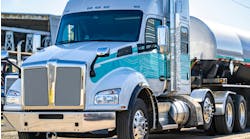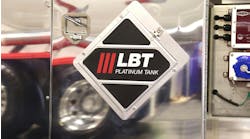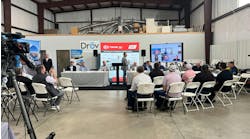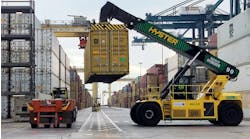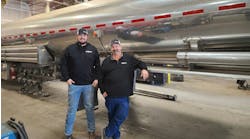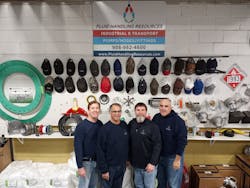All parts on deck: Fluid Handling boosts inventory to combat supply-chain constraints
John L. Girard worked on Mark 26 Guided Missile Launching Systems while serving aboard the U.S.S. Chandler during his time in the Navy.
That was the easier assignment he had then.
Girard also trained as a rescue swimmer. So he was well prepared to start Fluid Handling Resources in 2015—and keep it afloat amid COVID-19, inflation, and supply-chain constraints. His service instilled the value of hard work, and the determination to help customers at all costs, whether they need parts, repairs, or emergency response.
“When you’re in the Persian Gulf and something goes down, you don’t go to bed, and wake up the next day to work on it,” Girard said. “The work doesn’t stop until it’s fixed. That approach still helps me today.
“My mantra is, ‘If I can work on a $50 million missile launcher, I can fix a pump.’”
His refusal to let the Linden, N.J.-based equipment business sink ensured continued success during pandemic times. They’ve grown through word of mouth, walk-in business, and well-built relationships, and by going on the offensive for their customers’ tank truck fleets and facilities, stocking more parts than ever before.
“Shortages are still a huge challenge, and I’m probably carrying 60% more inventory than I ever have, because I don’t like to tell my customers they have to wait,” Girard said.
“I like being the vendor who people say, ‘They have it. I know I can call Fluid Handling.’”
Changing lanes
Understandably, Girard says saving lives was the most rewarding work he ever performed. But the physically taxing job also beat him up, leading to four shoulder surgeries. So, after five years in the Navy, achieving the rank of Gunner’s Mate 2nd Class, he was ready for the next adventure, starting with earning an education at Monmouth University.
But he called for a course correction midway through after a chat with his uncle.
At the time, in 1998, John C. Girard was president of Girard Equipment, the company he and his brother, Bob Girard—who is Girard’s dad—helped to flourish; and which was founded by their father, John L. “Jack” Girard, who’s Girard’s grandfather. Uncle John convinced him to pursue his degree while working part time in the family business, where he ended up staying for 17 years, primarily running the company’s former hose, fittings, and pumps—or “other peoples’ products”—division.
His time there sparked his entrepreneurial spirit, which his grandfather shared—along with the family name—and afforded him the knowledge he needed to get started.
“My uncle and cousins (Mike, Dave, and Tim Girard) gave me a lot of guidance growing up,” Girard said. “I couldn’t have done it without their help.”
Sink or swim
Girard founded Fluid Handling from his basement using his 401K through a Rollovers as Business Startups (ROBS) arrangement to secure capital. From the outset, his philosophy was built on integrity, open communication with customers and suppliers, and 24-7 support for the fleets they service. “You’ve got to be honest and truthful with your customers, and I really believe that’s at the heart of our growth,” Girard said.
“Anytime a customer needs something, we jump into action.”
To support his efforts, Girard recruited his father-in-law, Ted Sahn—who works part time at a very productive 75 years old—Dave Sydlosky, and Paul Altemus. Sydlosky spent 19 years at Girard Equipment before following Girard to Fluid Handling, and Altemus previously worked in his family’s former equipment business.
“It’s been challenging, it’s been scary, and there’s been a lot of sleepless nights, but it’s extremely rewarding,” Girard reflected. “I’m very lucky to have a wife (Geri) who supports me 100%, and she has from the beginning.”
Their mission is to assist in the process anywhere bulk liquids are conveyed.
Taking flight
Fluid Handling went from its basement beginning to a rented garage off the beaten path, and then a 6,000-square-foot building that is ideally situated in an industrial area of New Jersey, helping Fluid Handling advance its status as an equipment supplier for plants, terminals, and transportation companies. The facility features three bays, two filled with hose racks, and parts shelves and bins, and a machine shop.
“It’s grown exponentially,” Girard said. “It’s a great feeling of accomplishment for all of us here.”
Hoses and fittings still are their bread and butter. They’re a distributor of Contitech & Kuriyama hose, they carry hoses for breweries, chemical manufacturers, and many other industries; and stock every type of hose imaginable, from composite, dry bulk, and hydraulic hoses, to marine, wash rack, and vapor hoses. “You name the hose, and we have it or can get it,” Girard said.
They also carry pumps, valves, gaskets, compressors, power take-offs (PTOs)—and every other component, accessory, or mission-critical flow product imaginable for tank trailers, storage facilities, and process plants. The many brands they distribute include Betts, Blackmer, Dixon, Hannay, Ranger, Scully—and Girard Equipment. Key customers include Dana Companies fleets across the country, Linden Bulk Transportation, All Chemical Transport & Leasing, and Samuel Coraluzzo and Torrissi Transport. Fluid Handling keeps specially spec’d equipment on hand for key customers, and also supplies truck and trailer repair shops.
Their four-man team works together to care for customers beyond sales, customizing assemblies, repairing pumps, and rebuilding parts. And when they’re not busy with those tasks—which is rare these days—they’re checking on clients. “I’ll jump in a vehicle and make deliveries,” Altemus said. “It’s another way to reach out and satisfy customers. That way they don’t have to worry about coming in to pick something up.
“Whatever it takes. I like to get my hands dirty.”
Combating COVID
Military procurement is the fastest-growing segment of Fluid Handling’s business—keeping them busy and profitable throughout the pandemic.
After serving in the Navy, it’s now one of his biggest customers. Fluid Handling recently filled an order for a half-million dollars’ worth of pumps for the Navy, Girard said. “We’re extremely proud to be one of four companies in the world that can sell and support the Blackmer pump line to the military,” he explained. “So a lot of their pumps are used on Navy ships.” Some of those ships are then sold to countries around the world, and Fluid Handling supplies them as well. And with a growing roster of military clients, it remained open when nonessential businesses were ordered to close.
Government and military contracts now make up more than a quarter of Fluid Handling’s overall income. Girard credits a Blackmer connection for helping him develop their military business, which came with a huge, but hugely worthwhile, learning curve. “We’ve enjoyed 30% growth every year, except for the ‘COVID’ year, and we still grew by 10% during COVID, even when the spigots shut off between gasoline and chemicals.
“And that growth really was attributed to the military.”
Girard said they also reached out to customers to better understand their problems, and how Fluid Handling could best help. “By understanding what they were going through, we were able to adjust how we operated, and work with them,” he said. They also used any downtime they did have to streamline internal processes.
All parts on deck
Fluid Handling now has more than $400,000 tied up in inventory, with more than 4,000 SKUs stocked—and still doesn’t have everything.
Ferrules, needed for crimping hoses, have been hard to come by lately. So have the stainless-steel fittings chemical haulers need. “We’ve been waiting on three-quarter-inch air hose for over six months now, because our suppliers don’t have the materials they need to make the hose to sell to us,” Sydlosky added.
Procuring parts, they say, has become ‘extremely’ complex, like moving the last green square to the other side of a Rubik’s Cube. “Now there are nine more steps involved, because they don’t always have it, or it’s at another location, or they only have one, or the price has gone up 10%, so you call another person—but their price is up 30%,” Girard said.
They’ve changed their buying habits in response. First, they never stop buying. If they find it, they purchase it. Second, whenever possible, they don’t buy only one. “Instead of us ordering a dozen or two dozen of something, we’ll order 100 or 200, just to have it on hand, because there are so many delays in receiving items,” Sydlosky said.
Supply shortages lead to delayed orders. Altemus says they have several ready to go, except for one missing piece. But customers are sympathetic if you’re forthright about your parts chain plight. “Most of them understand anyway, because everyone, one way or another, has been affected by COVID or the logistics crunch,” Girard said.
And, if all else fails—especially in regard to price increases—say it with a smile.
Quality compatriots
That’s what Altemus does. The same goes for the entire team. That’s why their customers keep returning.
“We create such a strong bond with our customers that they rely on us,” Girard said. “If they need something on the weekend, we’ll be there for them. And they know that. And that’s what creates that strong relationship.”
Commitment combined with innovation strengthens bonds, creating more growth potential.
Sydlosky wants to further leverage his machining skills to bolster services. They’re also looking into expanding their online presence, while continuing to focus on the increasingly lucrative government and military segment.
“That’s something we’re just scratching the surface on,” Girard said.
Unfortunately, parts shortages aren’t going away, leaving the industry to play catchup for the foreseeable future, and making doing business more difficult. But with loyalty and service as guiding lights, Fluid Handling flows forward.
That was Jack’s philosophy—and one his grandson shares.
“You surround yourself with good people, good vendors, and good customers, and once you get that really good group of core people, it makes things a lot easier,” Girard said.
